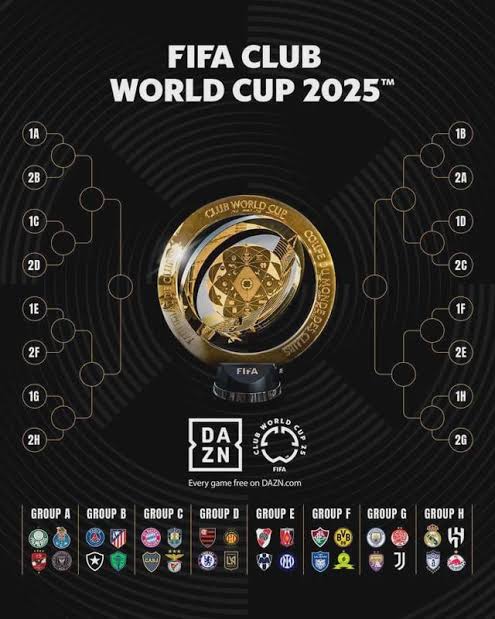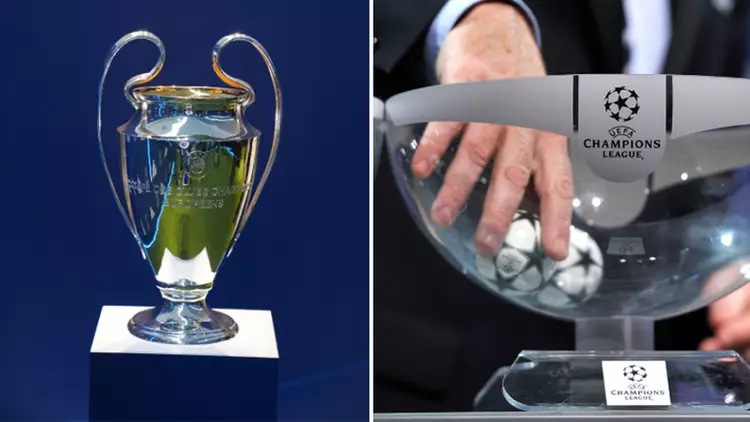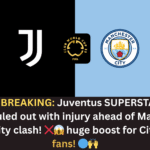Man City face the biggest opponent in club world cup

The FIFA Club World Cup has reached a pivotal moment as the round of 16 draw has been completed, revealing the paths that both Chelsea and Manchester City must navigate to reach the tournament’s showpiece final. The competition, which has brought together the world’s elite clubs from across all continents, has already provided moments of brilliance, tactical masterclasses, and unexpected results that have set the stage for what promises to be an enthralling knockout phase.
Manchester City have emerged as the tournament’s standout performers thus far, completing a perfect group stage campaign that has sent a clear message to their competitors. Pep Guardiola’s side concluded their Group G fixtures with a comprehensive 5-2 victory over Italian giants Juventus, a result that not only secured their position as group winners but also demonstrated the ruthless efficiency that has become synonymous with City’s approach under their Spanish manager.
The Citizens’ group stage campaign was nothing short of exceptional. They became the only team in the entire tournament to win all three of their group matches, a feat that speaks volumes about their preparation, squad depth, and tactical adaptability. This perfect record has positioned them as one of the tournament favorites, with many pundits and former players suggesting that City have laid down a marker for the remaining teams in the competition.
Erling Haaland’s continued goal-scoring prowess was on full display during the group stages, with the Norwegian striker finding the net multiple times and celebrating alongside teammates like Bernardo Silva, who has been instrumental in City’s creative play. The partnership between Haaland and Silva has been particularly effective, with the Portuguese midfielder’s vision and passing ability creating numerous opportunities for the prolific striker.
The victory over Juventus was particularly impressive given the caliber of opposition they faced. The Italian side, despite their recent struggles in domestic competition, brought a wealth of European experience to the encounter. However, City’s superior tactical execution and individual quality proved too much for the Turin-based club to handle.
In contrast to City’s flawless group stage performance, Chelsea faced a more challenging path through Group D. The Blues finished as runners-up behind Brazilian powerhouse Flamengo, a result that reflects both the competitive nature of their group and perhaps some of the transitional challenges the London club has faced in recent seasons.
Chelsea’s group stage campaign was characterized by moments of brilliance interspersed with periods of inconsistency. While they secured their place in the knockout rounds, their second-place finish means they face a potentially more difficult route to the final compared to their Premier League counterparts Manchester City.
The West London club’s performance in the group stages highlighted both their strengths and areas that require improvement. Their technical ability and individual talent were evident throughout their matches, but questions remain about their consistency and ability to perform under pressure in crucial moments. The fact that they finished behind Flamengo, while not necessarily a poor result given the Brazilian club’s quality, suggests that Chelsea will need to elevate their performance levels significantly if they are to progress deep into the tournament.
The round of 16 draw has produced some fascinating matchups that promise to deliver high-quality football and tactical intrigue. Manchester City have been paired with Al-Hilal, the Saudi Pro League representatives who finished second in Group H behind Real Madrid. This matchup presents an interesting contrast in styles, with City’s technical excellence and tactical sophistication set against Al-Hilal’s physicality and organized defensive approach.
Al-Hilal’s progression to the knockout stages should not be underestimated. The Saudi Arabian club has invested heavily in recent years, bringing in experienced international players and implementing modern coaching methods. Their ability to finish second behind Real Madrid demonstrates their competitive credentials and suggests they will provide a stern test for Guardiola’s side.
Chelsea, meanwhile, will face Portuguese giants Benfica in what promises to be one of the most evenly matched encounters of the round of 16. Benfica’s rich European pedigree and their ability to develop young talent while maintaining competitive standards make them formidable opponents. The Portuguese club’s technical approach and tactical discipline will test Chelsea’s ability to break down organized defenses while remaining solid at the back.
The Benfica versus Chelsea matchup is particularly intriguing from a tactical perspective. Both teams favor possession-based football and have technically gifted players throughout their squads. The battle in midfield is likely to be crucial, with both sides possessing players capable of controlling the tempo and creating scoring opportunities.
Perhaps the most exciting prospect emerging from the draw is the possibility of a Manchester City versus Chelsea semi-final encounter. Should both English clubs successfully navigate their respective routes through the knockout stages, they would meet in the semi-final, creating a fascinating all-Premier League affair on the global stage.
This potential matchup would represent more than just a meeting between two English clubs; it would be a clash between two distinct footballing philosophies and approaches. Manchester City’s possession-based, high-pressing style under Guardiola would come up against Chelsea’s more pragmatic, tactically flexible approach. The individual battles across the pitch would be compelling, with world-class players on both sides eager to make their mark on the global stage.
The journey to this potential semi-final would require both teams to overcome significant challenges. Manchester City would need to defeat Al-Hilal before facing either Inter Milan or Fluminense in the quarter-finals. The Italian side, with their defensive solidity and tactical acumen, would provide a stern test, while Fluminense’s Brazilian flair and technical ability could pose different problems.
Chelsea’s route is equally challenging, with Benfica representing a significant hurdle in the round of 16. Should they progress, they would face either Palmeiras or Botafogo in the quarter-finals. Both Brazilian clubs possess the technical skills and tactical awareness that could trouble the English side, particularly if Chelsea fail to find their best form.
The Club World Cup has attracted some of the biggest names in world football, creating compelling narratives that extend beyond individual club loyalties. Perhaps the most captivating storyline involves Lionel Messi and his Inter Miami side, who have been drawn against Paris Saint-Germain in the round of 16. This matchup represents a reunion between Messi and his former club, adding an emotional dimension to what promises to be a tactically fascinating encounter.
Messi’s move to Inter Miami has brought unprecedented global attention to Major League Soccer, and his performance in the Club World Cup represents an opportunity to showcase the league’s growing quality on the world stage. The Argentine maestro’s ability to influence games at the highest level remains undiminished, and his tactical understanding and technical brilliance will be crucial to Inter Miami’s hopes of progressing.
Paris Saint-Germain, despite no longer having Messi in their ranks, remain a formidable force with a squad packed with international talent. Their French domestic dominance and European ambitions make them one of the tournament favorites, but facing Messi and the narrative surrounding his return to face his former employers adds an extra layer of complexity to their preparation.
The tournament has also highlighted the continuing evolution of global football, with traditional European powerhouses facing challenges from clubs representing emerging football markets. Bayern Munich’s clash with Flamengo represents a fascinating encounter between German efficiency and Brazilian flair, two contrasting footballing cultures that have produced some of the sport’s most memorable moments.
Real Madrid’s matchup against Juventus presents a meeting between two of Europe’s most successful clubs, both with rich histories in continental competition. This encounter promises to be a tactical chess match between two sides that understand the importance of tournament football and possess the experience necessary to perform under pressure.
Borussia Dortmund’s encounter with Mexican side Monterrey adds another international flavor to the competition, showcasing the global reach of modern football and the increasing competitiveness of clubs from different continents.
Former Premier League goalkeeper Shay Given’s assessment of Manchester City’s performance following their victory over Juventus reflects the broader sentiment among football observers. His comments about City “shaking the tournament” and putting down a marker for their competitors highlight the psychological impact of dominant performances in knockout competitions.
Given’s analysis suggests that City’s comprehensive victory over Juventus has elevated expectations and potentially intimidated other competitors. The combination of individual brilliance, tactical sophistication, and squad depth that City displayed against the Italian side represents the standard that other teams must match if they hope to progress deep into the tournament.
The expert consensus appears to be that City have established themselves as the team to beat, but the knockout nature of the competition means that any result is possible. Single-elimination games can produce unexpected outcomes, and the pressure of representing their clubs on the global stage could affect even the most experienced players.
The round of 16 fixtures are scheduled to take place over several days, with kick-off times designed to accommodate global television audiences. The tournament’s scheduling reflects FIFA’s ambition to create a truly global spectacle that can rival other major international competitions.
The staggered fixture list, beginning with Palmeiras versus Botafogo and culminating with Borussia Dortmund versus Monterrey, ensures that football fans worldwide will have multiple opportunities to witness high-quality matches featuring some of the sport’s biggest stars.
The timing of the fixtures, particularly those involving English clubs, has been carefully considered to maximize viewing figures in key markets while ensuring that players have adequate rest between matches. This balance between commercial considerations and sporting integrity represents one of the ongoing challenges in modern football tournament organization.
As the Club World Cup enters its knockout phase, the stakes continue to rise for all participating clubs. For Manchester City and Chelsea, the tournament represents an opportunity to claim a prestigious trophy while testing themselves against the world’s best clubs from different continents.
The potential for an all-English semi-final adds extra significance to both clubs’ campaigns. Success in the Club World Cup would not only bring silverware but also enhance their reputations on the global stage and provide valuable experience for future international competitions.
The tournament’s format, which brings together clubs from different continents and footballing cultures, offers unique challenges that domestic competitions cannot replicate. Players must adapt to different styles of play, varying tactical approaches, and the pressure of representing their clubs on the world stage.
For neutral observers, the Club World Cup knockout phase promises to deliver compelling football narratives, tactical innovation, and individual brilliance. The combination of established European powers, emerging global forces, and legendary players creates a perfect storm of sporting entertainment that captures the imagination of football fans worldwide.
As the round of 16 approaches, anticipation continues to build for what promises to be a thrilling conclusion to this expanded Club World Cup format. The stage is set for memorable matches, potential upsets, and the crowning of a new world champion.















